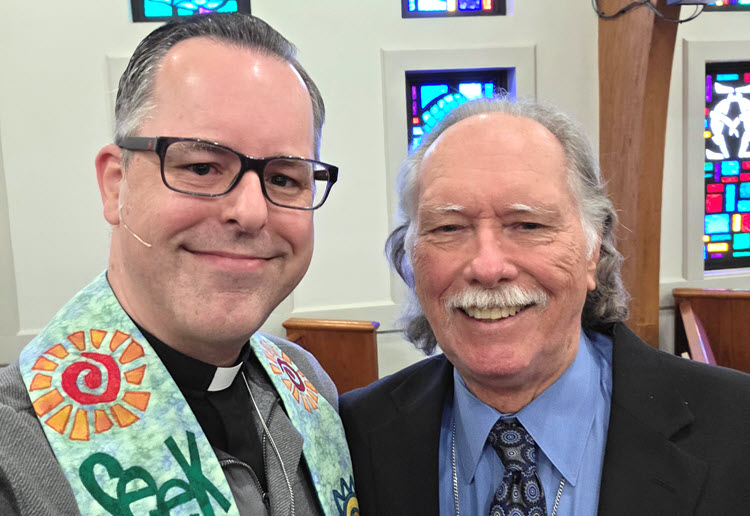This morning at Advent Lutheran Church (ELCA). we continued our Meeting Jesus Again series.

Sermon
My message, “Welcoming Doubt” is based on the narrative lectionary passage: Luke 7:18-23.
You can watch below or read the manuscript.
Excerpt
Just as good church members – of actual congregations as well as fictitious ones – know what to expect of a prospective pastor, John the Baptist knew what to expect of Jesus.
Remember siblings in Christ, this is the same John the Baptist who has been as strongly supportive of Jesus’ ministry as anyone. He is the one who was preaching in the wilderness. He is the one who baptized Jesus. He is the one who has prepared the way.
And, now, from a prison cell, he’s questioning it all. He’s asking, did I get this all wrong? Is Jesus not who I thought he was?
John the Baptist is so unsure of himself that he sends two of his disciples to Jesus to demand answers.
How did John the Baptist get to this point? The honest answer is “we don’t know.” Scholars advance a number of possibilities.
I have to believe part of the answer is situational. John was in prison. He wasn’t there because he was violent. John was imprisoned because he spoke the truth to power.
You might remember that John was a very blunt preacher. While his directness was a strength, it was also what landed him in jail and would later get him beheaded.
John spoke ill of a politician. He told anyone who would listen that Herod Antipas was anything but a moral man. He questioned the ruler’s marriage and, according to Luke, he also questioned “all of the other evil things” Herod had done.[1]
Now, after spending some time in prison, John is questioning everything. He’s remembering all that he had learned about the Messiah and he’s wondering why things are not yet going as he imagined. He and others have expectations for the Messiah that Jesus hasn’t fulfilled. They were looking for someone who was more of a conquering King and less of an itinerant preacher and healer.
Imprisoned indefinitely and beginning to second guess himself and question the value of his life’s work, he sends a couple of disciples to ask Jesus what he wishes he could ask himself. They look Jesus in the eye and ask, “Jesus are you the one we’ve been waiting for or not?”[2]
Jesus answers as only Jesus can. Rather than a simple yes or no reply, Jesus invites them to reflect on what they already know. He says, “Go back and report to John what you have seen and heard: The blind receive sight, the lame walk, those who have leprosy are cleansed, the deaf hear, the dead are raised, and the good news is proclaimed to the poor.[3]”
Put differently, Jesus tells them to tell John: “I am he. I am legit. I am the one you’ve been waiting for. The message I preached in my first sermon is the one I’ve embodied every day since.”[4]
And, Jesus continues being who he always was while these disciples relay his message to John. Jesus’ own affirmation of his identity is exactly what John needed to hear.
Maybe you are wondering about Pastor Jeremiah – the pastor in the story that I related earlier. Remember how his congregation doubted him because in one very visible way he didn’t fit their expectations? He didn’t look the part of the one they knew was soon to come.
And, yet, he was that pastor. He invited their doubt. And, I assume he also created space to help them overcome it.
As he spoke for the first time. As they started to get to know him for who he really was – not just based on his resume or a single unusual entrance. I picture Pastor Jeremiah inviting their questions and patiently responding to each and every one.
How much more patient and loving must Jesus have been with those who doubted him, including John the Baptist. Jesus’ ministry was unlike anything anyone had ever seen before. Jesus knows that truly accepting him for who he is will be hard for his followers and becomes harder still when he is physically absent.
Jesus never condemns John for his doubt. Instead, Jesus welcomes his doubt and ours.
I don’t know your story of doubt, but I imagine you have one.
[1] Luke 3:19.
[2] Luke 7:20.
[3] Luke 7:22.
[4] Luke 4:14-30.